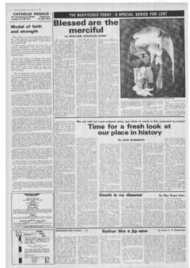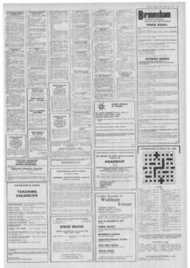Page 5, 29th March 1974
Page 5

Report an error
Noticed an error on this page?If you've noticed an error in this article please click here to report it.
Tags
Share
Related articles
New Triumphalism 'makes The Old Seem Benign'
Tory Policy On Coercive Abortion: 'no U-turn"
Broadside From 'faith'
Archbishop B Owen
Reconciliation In Faith
'Faith' and the Agreed Statement on the Ministry
Your paper must be congratulated for its coverage, in your March 22 issue, of the "Faith" magazine articles dealing with the Canterbury Statement on the Christian Ministry. However, there is just one matter which I regard as a little unfortunate. Your leading article refers to attacks on Bishop Clark, Bishop Butler and Archbishop Dwyer. This could leave those who have not read "Faith" with a wrong impression. The Canterbury Statement, like the Windsor Statement before it, was published specifically to be discussed. In "Faith" magazine and the book, "The Eucharist, Unity or Truth," this discussion is offered to readers by men who have established themselves as specialists in the matter. Fr Holloway is a professional theologian who taught his subject for many years and has written what many people
MORE LETTERS ON PAGE 8
believe to be the most penetrating study of Catholic doctrine since the Second Vatican Council: "Catholicism, a New Synthesis". Fr Knowles, Christopher Derrick and the other contributors are similarly competent. It would be a pity if discussion of the Statements should descend to the level of personalities. May I add that the Canterbury Statement was recently discussed at a meeting of Faith Association in London under my chairmanship attended by many priests who arc widely known and respected for their theological competence, apostolic zeal and balanced objectivity, including many of the younger clergy.
Throughout the day a spirit of intense charity was evident on all sides. Faith Association and its magazine try at all times to help the Church by an apostolate which is faithful to the old adage, suaviter in modo, fortiter in re (sweet. gentle and kindly in manner but strong and firm in content). .
(Very Rev) Francis J. Ripley, VF, Chairman, Faith Association and of the Editorial Board, "Faith" Magazine.
Church of St Oswald and St Edmund, Ashton-in-Makerfield, Wigan, Lancashire.
May I offer the following comments on the last two paragraphs of your editorial of March 22?
I "Those, meanwhile, who have been reading the excellent editorials in the Clergy Review will have the advantage of sound theological guidelines on post-Vatican Two developments on the Christian priesthood." I imagine you would not wish this to apply to the writing on the priesthood by the editor, Fr Michael Richards. in the January number of that periodical. 2 "And while Fr Holloway's thesis — though the circulation of his magazine is small — should be read with care . ."
Does this imply that the reliability of a periodical varies directly with the size (4 its circulation? I find this a peculiar doctrine.
3 "We are being invited, in other words, to pray and to study in order to clarify some matters that have long been doubtful and obscure."
The nature and function of the Catholic priesthood as elucidated and upheld by the teaching authority of the Church from the earliest times
is certainly not one of them: its most recent re-emphasis is in Mysterium Eccksiae (July 5,
1973). It is because the Agreed Statement on the Ministry calls this teaching into question that it has itself been called in question, as it deserved to be, by the writers in Faith.
4 "Loyalty to official teaching is not perhaps the ultimate panacea for all ills. but trust in a private minority opinion would at the very lowest, be temerarious in the extreme."
Precisely: but who represents the "private minority opinion" — Bishop Clark and his colleagues on the Commission that produced the Agreed Statement or the writers in Faith who stand by the teaching authority of the Church? Obviously, the former. The boot is on the other foot.
(Fr) Paul Crane, SJ Editor, Christian Order 65 Belgrave Road, London SW1.
As one Anglican-Catholic "agreed statement" succeeds another, one wonders what the attempt by the Catholic members to water down their Church's doctrines to arrive at a "converging compatibility" with the Anglicans is meant to achieve.
The general idea (mooted at times by both Dr Ramsey and Bishop Butler) seems to be that one day there will result, not organic union, but a Church of England. whose orders and Eucharist are fully recognised by Rome, existing side by side as a sister "uniate" body with the English Roman Catholic Church.
What the ecumenists on both sides — particularly the euphoric Catholic ones — do not seem to realise arc the implications of Rome recognising a state of full intercornmunion with Canterbury involving the Eucharist and the priesthood.
For the Catholic Eucharist and Mass signify not only the continuing presence of Christ in his Church and the sacramental graces flowing therefrom: they are also the indelible hallmark of the orthodoxy and unity of Christ's Church in all matters of revealed truth including the moral laws.
If the Church of England already presents a picture of divided beliefs about the ministry and the Eucharist, many of its members, both clerical and lay, are even more divided on the moral laws affecting human conduct. Thus, in the final analysis, it is inconceivable that the Catholic bishops in this country could be in "communion" with their pisposite numbers in the Church of England, or a Catholic receive the Eucharist in an Anglican church, when clerics of the latter body also differ on such doctrines as the Virgin Birth and the nature of the divinity of Christ, and can publicly declare their belief in divorce, contraception, abortion and euthanasia.
Such a situation would contradict Christ's promise to his Church of unity in all things — of which the Catholic Eucharist is the essence, the symbol and the guarantee. For the Catholic hierarchy in this country to delay in spelling out these wider and fundamental ecumenical realities is to make the inevitable moment of truth for our separated brethren much harder to bear.
D. G. Galvin Meadow Bank, The Common, Wonersh, Guildford, Surrey.
am sure that the Faith Association has views and arguments that ought to be heard. but I for one have found that I cannot, alas, rely on what I read in Faith.
I attended the Study Day at Redhill on March 9 when the Agreed Statement on the Ministry was discussed. I Was surprised to find that although the occasion had been organised by his diocese, Fr Holloway was not there to present his point of view.
If other members or the Faith Association were there they certainly did not speak up in what was a very frank hut friendly meeting. Had Fr Holloway been there he could have assured Fr Tolhurst that, far from Canon Wilkinson's being opposed to the document as regards its substance, he was critical that its language was that of a legalistic document and it needed "flesh and blood."
Also he was disappointed at the lack of interest shown in the more responsible Catholic journals. particularly in the correspondence columns. I repeat that a great opportunity appears to have been lost to hear and discuss the contribution that Fr Holloway and his colleagues could have made to the debate.
(Brig) John Clemow 316 Coulsdon Road, Old Coulsdon, Surrey.
One must be grateful that you have publicised (March 22) the criticisms of the "Agreed Statements" expressed in Faith, for although these criticisms are widely held they receive little publicity.
However, one cannot but be
sad at the conclusion of your editorial, that the views as expressed in Faith represent the opinion of a minority. This only goes to show how far removed the "intellectuals" arc from the sensus communis fidelium which Faith would probably have been expressing rather than the minority who agreed to the Statements. (Fr) B. J. Rylands St Peter's Church, Jesse! Street, Mill Hill, Blackburn, Lancashire.
I read with interest (March 22) the grounds of Fr Holloway's disagreement with the Canterbury Statement on the Ministry. You summarise him as saying that, "the offices of bishop. priest and deacon must have emerged in the time of the apostles. or there would be no reason to maintain them now."
Your Anglican readers will find his reasoning congenial, for the Preface to the Ordinal contained in every Book of Common Prayer states: "It is evident unto all men diligently reading Holy Scripture and ancient authors, that from the Apostles' time there have been these 'Orders of Ministers in Christ's Church; Bishops, Priests and Deacons." Later it goes on with the words: "And therefore, to the intent that these Orders may be continued It would appear to me that Fr Holloway has, perhaps unwittingly. found himself in substantial agreement with the Reformers and, of course, with the chief argument of those who believe in the validity of Anglican Orders. May I conclude, Sir, by saying how much your editorial this week is appreciated by those who long to see the end of the breach between Canterbury and the Holy See?
(Rev) R. G. Dinnis St John's Vicarage, Goldcnhill, Stoke-on-Trent, Staffordshire.
blog comments powered by Disqus











